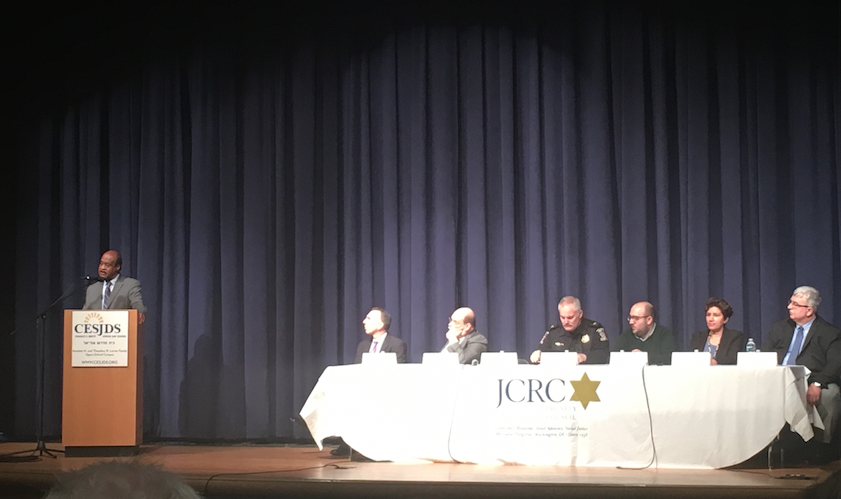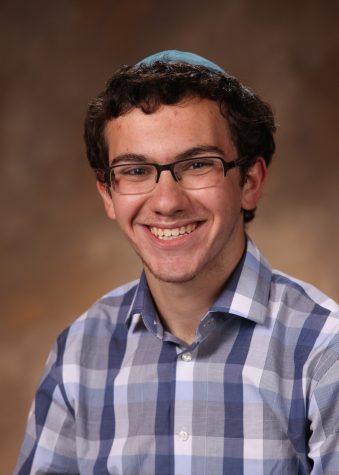Local community fights anti-Semitism
Forum on combating hate speech held at Upper School
A panel of Montgomery County officials, leaders of Jewish advocacy groups and Head of School Rabbi Mitchel Malkus spoke in the theater on Jan. 4.
January 19, 2017
To combat bigotry of all kinds, and specifically anti-Semitism, Montgomery County authorities have reaffirmed their commitment to battling hate through law enforcement and education.
Community leaders gathered on Jan. 4 to discuss the recent increase in local incidents of hate speech. The panel was held at the Upper School and was hosted by both CESJDS and the Jewish Community Relations Council of Greater Washington (JCRC).
In 2015, Montgomery County experienced 66 hate crimes, according to Montgomery County Chief of Police Tom Manger. In 2016, this number increased to 87 hate crimes. Thirty-seven of those acts were religiously motivated, 31 of which were against the Jewish community.
“These [hate] crimes not only have a profound impact on the victims, but they can have a major impact on the community,” Manger said. “These are crimes against all of us.”
Some of these crimes directly affect children at county schools, generating community concern. At Westland Middle School in Bethesda, for example, police investigated swastikas that were drawn in the boy’s bathroom in November.
Though JDS has not been a target of hate crimes like Westland, many parents were still worried about rising anti-Semitism across the area. This concern was a primary reason for the forum, Head of School Rabbi Mitchel Malkus said in an interview after the event.
“I felt that the school needed to step up and provide a forum for local community leaders to speak freely with the community and hear what are the real concerns of people in the community,” Malkus said.
County Executive Ike Leggett began his prepared statement by explaining that up until recently he did not think that anti-Semitism was a major local issue, but that the current situation requires new attention. Leggett used a football metaphor to explain that although the local community got better at fighting hate, it lately took steps back.
“The ball has been taken all the way down to the 5-yard line, and society was 5 yards away from where we want to be,” Leggett said. “But now, the ball has been picked up, fumbled and taken back behind the 50-yard line.”
Leggett and Malkus spoke along with Manger; Superintendent of Schools Dr. Jack Smith; Saida Hentati, the Parent Community Coordinator at Montgomery County Public Schools; Seth Gordon-Lipkin, the Anti-Defamation League’s Washington, D.C. Regional Office Education Director; and JCRC Executive Director Ron Halber. After the speeches, the panel took questions from parents in the audience.
One of the audience questions came from Kathy Katz, mother of sophomore Zev Katz, alumna Elie Katz (‘16), alumna Eden Katz (‘12) and alumnus Noah Katz (‘09). Kathy said that one time when Zev was walking home from synagogue, he passed a man who said to him: “Are you a Jew? I don’t want you bringing bad luck on my house. From now on you walk on the other side of the street.”
While the event focused on how parents can address anti-Semitism, Manger said that teenagers also need to take responsibility for their actions and help themselves adjust to the world in which they live. Manger believes that it is critical for parents to hold conversations with their children about anti-Semitism throughout middle school and high school.
“Their mind is going to places it’s never been before and they’re getting involved in discussions they’ve never been involved with before,” Manger said. “We need to guide them as best we can.”
Though Manger said that hate crimes can be difficult for police to solve, adding that only about a third of cases are solved, he said that there are ways civilians can help. Manger encourages citizens to “be a good witness” by reporting everything they see and using technology to record crimes and send the videos to police.
Smith presented another measure for helping fight these hate crimes. The superintendent said that his most important job is to keep students in his system safe, but that he also wants to keep schools educated on how to fight hate and bigotry.
“We teach and we learn together,” Smith said. “We give lots of information to principals and teachers.”
Malkus has taken this message to heart, and thinks that the program was an important step in JDS educating its community about anti-Semitism.
“I think what we’ve done is we’ve shined a light on the issue that we’re facing,” Malkus said.
A version of this article appeared on lionstale.org on Jan. 5, 2017 with the headline “Forum on combating hate speech held at Upper School.” To read the article from Jan. 5, click here.








